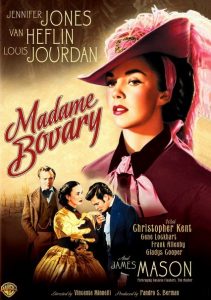Madame Bovary-1949
Director Vincente Minnelli
Starring Jennifer Jones, James Mason
Scott’s Review #930
Reviewed August 13, 2019
Grade: A-
Madame Bovary (1949) is a film adaptation of Gustave Flaubert’s famous novel. Remade a handful of times since this version, Jennifer Jones is cast in the lead role and does a fantastic job with a complicated part.
The title character is central to the controversial film, which will undoubtedly result in mixed opinions of her actions and motivations- whether she will be loved or loathed.
Director Minnelli mixes melodrama and glamour with pain and defeat in her story of one woman’s attempt at happiness.
Cleverly, the story is told within a story as the viewer is immediately amid a compelling and dramatic trial. Flaubert (James Mason) defends his novel depicting an adulterous woman (Jones) ruining the lives of men, deemed disgraceful to France and all womanhood.
He tells the story from his perspective and, through this, Madame Bovary’s perspective. She (Emma) marries a small-town country doctor, Charles Bovary (Van Heflin), and quickly grows disappointed with his lack of status.
Feeling trapped and unfulfilled, she embarks on failed romances with other men as she attempts to ascend the social ladder.
As with the novel, the theme is either understanding or abhorring Emma’s feelings and actions, or perhaps a mixture of both emotions.
Who would not forsake her for being true to her feelings and desiring her piece of the pie? Most women of her day were reduced to matronly statuses or asexual feelings, but Emma wanted satisfaction and life at the risk of her own family.
To counter these lustful feelings, she does not treat her husband very well, resenting his passivity and being disappointed at her daughter being a girl instead of her desired son.
She feels this would have allowed her better status, so her daughter is nearly shunned, preferring the affections of the housekeeper to her mother’s feeble attempts at love.
Is she Hellion or a sympathetic soul? Emma is one of the most complex of all female film characters.
Madame Bovary was written in 1949, and the novel was published earlier, so the progressive slant is rich and worthy of much admiration. The female perspective and the courage to reach for the stars and grasp life are spirited and wonderful to see, especially given the period.
A mixture of romantic drama and torrid affairs is at hand during this experience and always is the character’s center stage.
The film mixes Gone with the Wind (1939) remnants, especially the lavish dance hall sequence. The ball is the highlight, with gorgeous costumes, great cinematography, and bombastic dances.
As Emma cavorts with a dashing aristocrat, Rodolphe (Louis Jourdan), Charles gets drunk and makes a fool of himself, as her genuine disdain for her marriage becomes clear. The smashing windows with chairs moment is ahead of its time because of the effects used, and the constant dance twirls are dizzying.
So much importance occurs in this pivotal sequence.
While more than adequate, Jones would not have been my first choice for the role. Married to influential producer David O. Selznick, it was rumored that many of the actresses’ roles were given to her.
Delicious is to fantasize at what legends such as Bette Davis or Vivian Leigh might have brought to the character. Especially Leigh, given her dazzling performance as Scarlett O’Hara in Gone with the Wind, a follow-up as a similar and arguably more complex character is fun to imagine.
A film that allows for post-credits discussion is always positive, with Madame Bovary (1949) a lengthy analysis of a character begs deliberation.
Minnelli pours love and energy into a work dripping with nuances long before his famous musicals came to fruition. A strong and vital female character suffers a lonely and despairing fate, which is tragic and sad, but she lives her life with a zest that should empower us all.
Oscar Nominations: Best Art Direction-Set Decoration, Black-and-White
